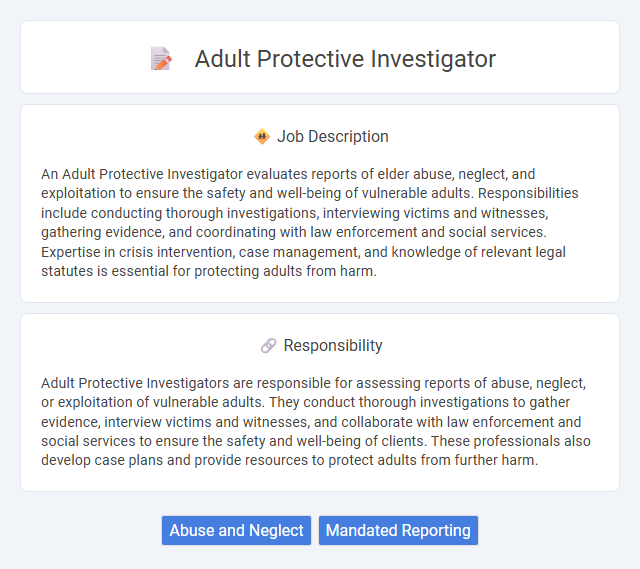
An Adult Protective Investigator evaluates reports of elder abuse, neglect, and exploitation to ensure the safety and well-being of vulnerable adults. Responsibilities include conducting thorough investigations, interviewing victims and witnesses, gathering evidence, and coordinating with law enforcement and social services. Expertise in crisis intervention, case management, and knowledge of relevant legal statutes is essential for protecting adults from harm.
Adult protective investigators often work with vulnerable adults who may be experiencing abuse, neglect, or exploitation, requiring strong emotional resilience and compassion. Individuals with a high tolerance for stress, excellent communication skills, and a commitment to advocacy are more likely to be suitable for this challenging yet rewarding role. Those who struggle with confronting difficult situations or managing emotional intensity might find this job less compatible with their personal strengths.
Qualification
An Adult Protective Investigator typically requires a minimum of a bachelor's degree in social work, psychology, criminal justice, or a related field, combined with relevant experience in social services or law enforcement. Certification in Adult Protective Services (APS) or specialized training in elder abuse, neglect, and exploitation is highly valued. Strong communication, investigative skills, and knowledge of state and federal laws governing adult protection are essential qualifications for success in this role.
Responsibility
Adult Protective Investigators are responsible for assessing reports of abuse, neglect, or exploitation of vulnerable adults. They conduct thorough investigations to gather evidence, interview victims and witnesses, and collaborate with law enforcement and social services to ensure the safety and well-being of clients. These professionals also develop case plans and provide resources to protect adults from further harm.
Benefit
An adult protective investigator likely provides essential benefits by safeguarding vulnerable adults from abuse, neglect, or exploitation, enhancing their safety and well-being. This role may also contribute to increased community awareness and prevention of elder abuse, fostering a more secure living environment. Employment in this field probably offers meaningful job satisfaction and opportunities for professional growth in social services.
Challenge
An Adult Protective Investigator job likely involves navigating complex and sensitive situations where vulnerable adults may face abuse or neglect. The challenge often lies in gathering credible evidence while respecting privacy and legal constraints. Investigators probably need strong critical thinking and communication skills to effectively assess risks and coordinate with social services.
Career Advancement
Adult protective investigators can advance their careers by gaining specialized certifications in social work or criminal justice, enhancing their expertise in vulnerable adult law and abuse prevention. Pursuing leadership roles such as supervisory investigator or case manager opens opportunities for greater responsibility and influence within adult protective services agencies. Continuous professional development through training in forensic interviewing and trauma-informed care significantly increases prospects for promotion and salary growth.
Key Terms
Abuse and Neglect
Adult Protective Investigators conduct thorough assessments to identify and address cases of abuse and neglect involving vulnerable adults. They gather evidence, interview victims and witnesses, and collaborate with social services and law enforcement to ensure the safety and well-being of at-risk individuals. Their role is critical in preventing exploitation, physical harm, and neglect in community and residential settings.
Mandated Reporting
Adult Protective Investigators play a critical role in safeguarding vulnerable adults by identifying and investigating cases of abuse, neglect, and exploitation. Mandated reporting laws require these professionals to promptly report any suspected harm to adult protective services or relevant authorities to ensure immediate intervention. Their work involves thorough documentation, collaboration with law enforcement, and connecting victims with essential resources to promote safety and well-being.
 kuljobs.com
kuljobs.com